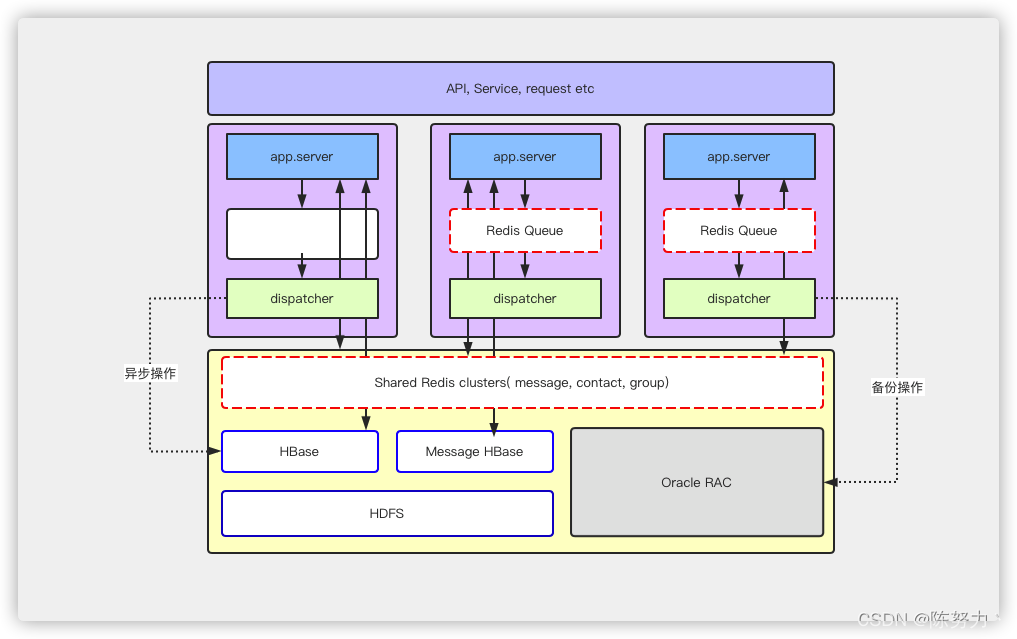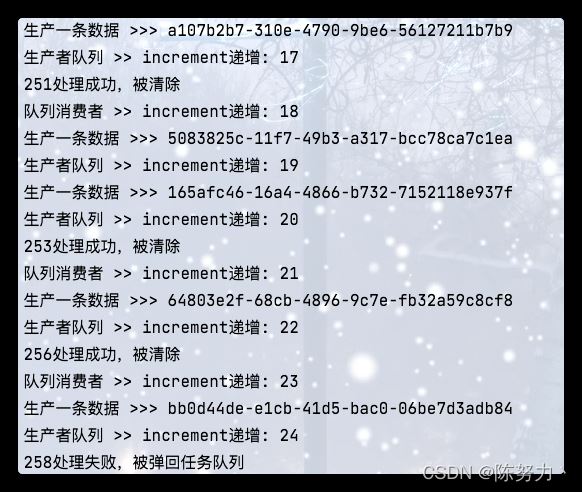这篇文章主要介绍Java redisTemplate阻塞式处理消息队列的示例分析,文中介绍的非常详细,具有一定的参考价值,感兴趣的小伙伴们一定要看完!


package cn.stylefeng.guns.knowledge.modular.knowledge.schedule;
import lombok.extern.slf4j.Slf4j;
import org.springframework.data.redis.core.RedisTemplate;
import java.util.Random;
import java.util.UUID;
/**
* <p>
* 队列生产者
* </p>
*
* @SINCE 2021/11/30 21:03
* @AUTHOR dispark
* @Date: 2021/11/30 21:03
*/
@Slf4j
public class QueueProducer implements Runnable {
/**
* 生产者队列 key
*/
public static final String QUEUE_PRODUCTER = "queue-producter";
private RedisTemplate<String, Object> redisTemplate;
public QueueProducer(RedisTemplate<String, Object> redisTemplate) {
this.redisTemplate = redisTemplate;
}
@Override
public void run() {
Random random = new Random();
while (true) {
try {
Thread.sleep(random.nextInt(600) + 600);
// 1.模拟生成一个任务
UUID queueProducerId = UUID.randomUUID();
// 2.将任务插入任务队列:queue-producter
redisTemplate.opsForList().leftPush(QUEUE_PRODUCTER, queueProducerId.toString());
log.info("生产一条数据 >>> {}", queueProducerId.toString());
} catch (Exception e) {
e.printStackTrace();
}
}
}
}package cn.stylefeng.guns.knowledge.modular.knowledge.schedule;
import lombok.extern.slf4j.Slf4j;
import org.springframework.data.redis.core.RedisTemplate;
import java.util.Random;
/**
* <p>
* 队列消费者
* </p>
*
* @SINCE 2021/11/30 21:14
* @AUTHOR dispark
* @Date: 2021/11/30 21:14
*/
@Slf4j
public class QueueConsumer implements Runnable {
public static final String QUEUE_PRODUCTER = "queue-producter";
public static final String TMP_QUEUE = "tmp-queue";
private RedisTemplate<String, Object> redisTemplate;
public QueueConsumer(RedisTemplate<String, Object> redisTemplate) {
this.redisTemplate = redisTemplate;
}
/**
* 功能描述: 取值 - <brpop:阻塞式> - 推荐使用
*
* @author dispark
* @date 2021/11/30 21:17
*/
@Override
public void run() {
Random random = new Random();
while (true) {
// 1.从任务队列"queue-producter"中获取一个任务,并将该任务放入暂存队列"tmp-queue"
Long ququeConsumerId = redisTemplate.opsForList().rightPush(QUEUE_PRODUCTER, TMP_QUEUE);
// 2.处理任务----纯属业务逻辑,模拟一下:睡觉
try {
Thread.sleep(1000);
} catch (InterruptedException e) {
e.printStackTrace();
}
// 3.模拟成功和失败的偶然现象,模拟失败的情况,概率为2/13
if (random.nextInt(13) % 7 == 0) {
// 4.将本次处理失败的任务从暂存队列"tmp-queue"中,弹回任务队列"queue-producter"
redisTemplate.opsForList().rightPush(TMP_QUEUE, QUEUE_PRODUCTER);
log.info(ququeConsumerId + "处理失败,被弹回任务队列");
} else {
// 5. 模拟成功的情况,将本次任务从暂存队列"tmp-queue"中清除
redisTemplate.opsForList().rightPop(TMP_QUEUE);
log.info(ququeConsumerId + "处理成功,被清除");
}
}
}
}@Test
public void QueueThreadTotalEntry() throws Exception {
// 1.启动一个生产者线程,模拟任务的产生
new Thread(new QueueProducer(redisTemplate)).start();
Thread.sleep(15000);
// 2.启动一个线程者线程,模拟任务的处理
new Thread(new QueueConsumer(redisTemplate)).start();
// 3.主线程
Thread.sleep(Long.MAX_VALUE);
}线程一:
Long increment = redisTemplate.opsForValue().increment("increment", 1L);
log.info("队列消费者 >> increment递增: {}", increment);线程二:
Long increment = redisTemplate.opsForValue().increment("increment", 1L);
log.info("生产者队列 >> increment递增: {}", increment);
redisTemplate处理/获取redis消息队列
(参考代码)
/**
* redis消息队列
*/
@Component
public class RedisQueue {
@Autowired
private RedisTemplate redisTemplate;
/** ---------------------------------- redis消息队列 ---------------------------------- */
/**
* 存值
* @param key 键
* @param value 值
* @return
*/
public boolean lpush(String key, Object value) {
try {
redisTemplate.opsForList().leftPush(key, value);
return true;
} catch (Exception e) {
e.printStackTrace();
return false;
}
}
/**
* 取值 - <rpop:非阻塞式>
* @param key 键
* @return
*/
public Object rpop(String key) {
try {
return redisTemplate.opsForList().rightPop(key);
} catch (Exception e) {
e.printStackTrace();
return null;
}
}
/**
* 取值 - <brpop:阻塞式> - 推荐使用
* @param key 键
* @param timeout 超时时间
* @param timeUnit 给定单元粒度的时间段
* TimeUnit.DAYS //天
* TimeUnit.HOURS //小时
* TimeUnit.MINUTES //分钟
* TimeUnit.SECONDS //秒
* TimeUnit.MILLISECONDS //毫秒
* @return
*/
public Object brpop(String key, long timeout, TimeUnit timeUnit) {
try {
return redisTemplate.opsForList().rightPop(key, timeout, timeUnit);
} catch (Exception e) {
e.printStackTrace();
return null;
}
}
/**
* 查看值
* @param key 键
* @param start 开始
* @param end 结束 0 到 -1代表所有值
* @return
*/
public List<Object> lrange(String key, long start, long end) {
try {
return redisTemplate.opsForList().range(key, start, end);
} catch (Exception e) {
e.printStackTrace();
return null;
}
}
}以上是“Java redisTemplate阻塞式处理消息队列的示例分析”这篇文章的所有内容,感谢各位的阅读!希望分享的内容对大家有帮助,更多相关知识,欢迎关注亿速云行业资讯频道!
免责声明:本站发布的内容(图片、视频和文字)以原创、转载和分享为主,文章观点不代表本网站立场,如果涉及侵权请联系站长邮箱:is@yisu.com进行举报,并提供相关证据,一经查实,将立刻删除涉嫌侵权内容。